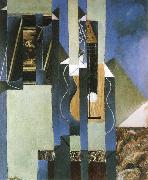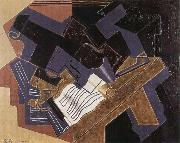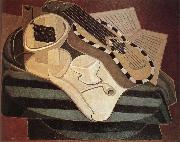Wholesale Oil Painting No Minimum |
|||||||||||
|
|
|||||||||||

|
|||||||||||
|
|
|
||||||||
Juan Gris1887-1927 Born in Madrid, he studied mechanical drawing at the Escuela de Artes y Manufacturas in Madrid from 1902 to 1904, during which time he contributed drawings to local periodicals. From 1904 to 1905 he studied painting with the academic artist Jose Maria Carbonero. In 1906 he moved to Paris and became friends with Henri Matisse, Georges Braque, Fernand Leger, and in 1915 he was painted by his friend, Amedeo Modigliani. In Paris, Gris followed the lead of another friend and fellow countryman, Pablo Picasso. His portrait of Picasso in 1912 is a significant early Cubist painting done by a painter other than Picasso or Georges Braque. (Although he regarded Picasso as a teacher, Gertrude Stein acknowledged that Gris "was the one person that Picasso would have willingly wiped off the map.") Portrait of Picasso, 1912, The Art Institute of Chicago.Although he submitted darkly humorous illustrations to journals such as Le Rire, L'assiette au beurre, Le Charivari, and Le Cri de Paris, Gris began to paint seriously in 1910. By 1912 he had developed a personal Cubist style. At first Gris painted in the analytic style of Cubism, but after 1913 he began his conversion to synthetic Cubism, of which he became a steadfast interpreter, with extensive use of papier coll??. Unlike Picasso and Braque, whose Cubist works were monochromatic, Gris painted with bright harmonious colors in daring, novel combinations in the manner of his friend Matisse. In 1924, he first designed ballet sets and costumes for Sergei Diaghilev and the famous Ballets Russes. Gris articulated most of his aesthetic theories during 1924 and 1925. He delivered his definitive lecture, Des possibilit??s de la peinture, at the Sorbonne in 1924. Major Gris exhibitions took place at the Galerie Simon in Paris and the Galerie Flechtheim in Berlin in 1923, and at the Galerie Flechtheim in D??sseldorf in 1925. He died in Boulogne-sur-Seine (Paris) in the spring of 1927 at the age of forty, leaving a wife, Josette, and a son, Georges. |
||||||||
|
|
||||||||
Guitar
Guitar Painting ID:: 36522 |
mk112
1913
Oil on canvas
61x50cm
mk112 1913 Oil on canvas 61x50cm |
|||||||
|
|
||||||||
Juan Gris1887-1927 Born in Madrid, he studied mechanical drawing at the Escuela de Artes y Manufacturas in Madrid from 1902 to 1904, during which time he contributed drawings to local periodicals. From 1904 to 1905 he studied painting with the academic artist Jose Maria Carbonero. In 1906 he moved to Paris and became friends with Henri Matisse, Georges Braque, Fernand Leger, and in 1915 he was painted by his friend, Amedeo Modigliani. In Paris, Gris followed the lead of another friend and fellow countryman, Pablo Picasso. His portrait of Picasso in 1912 is a significant early Cubist painting done by a painter other than Picasso or Georges Braque. (Although he regarded Picasso as a teacher, Gertrude Stein acknowledged that Gris "was the one person that Picasso would have willingly wiped off the map.") Portrait of Picasso, 1912, The Art Institute of Chicago.Although he submitted darkly humorous illustrations to journals such as Le Rire, L'assiette au beurre, Le Charivari, and Le Cri de Paris, Gris began to paint seriously in 1910. By 1912 he had developed a personal Cubist style. At first Gris painted in the analytic style of Cubism, but after 1913 he began his conversion to synthetic Cubism, of which he became a steadfast interpreter, with extensive use of papier coll??. Unlike Picasso and Braque, whose Cubist works were monochromatic, Gris painted with bright harmonious colors in daring, novel combinations in the manner of his friend Matisse. In 1924, he first designed ballet sets and costumes for Sergei Diaghilev and the famous Ballets Russes. Gris articulated most of his aesthetic theories during 1924 and 1925. He delivered his definitive lecture, Des possibilit??s de la peinture, at the Sorbonne in 1924. Major Gris exhibitions took place at the Galerie Simon in Paris and the Galerie Flechtheim in Berlin in 1923, and at the Galerie Flechtheim in D??sseldorf in 1925. He died in Boulogne-sur-Seine (Paris) in the spring of 1927 at the age of forty, leaving a wife, Josette, and a son, Georges. |
||||||||
|
|
||||||||
|
|
Guitar
Guitar Painting ID:: 36581 |
mk112
1920
Oil on canvas
65x81.5cm
mk112 1920 Oil on canvas 65x81.5cm |
||||||
|
|
||||||||
Juan Gris1887-1927 Born in Madrid, he studied mechanical drawing at the Escuela de Artes y Manufacturas in Madrid from 1902 to 1904, during which time he contributed drawings to local periodicals. From 1904 to 1905 he studied painting with the academic artist Jose Maria Carbonero. In 1906 he moved to Paris and became friends with Henri Matisse, Georges Braque, Fernand Leger, and in 1915 he was painted by his friend, Amedeo Modigliani. In Paris, Gris followed the lead of another friend and fellow countryman, Pablo Picasso. His portrait of Picasso in 1912 is a significant early Cubist painting done by a painter other than Picasso or Georges Braque. (Although he regarded Picasso as a teacher, Gertrude Stein acknowledged that Gris "was the one person that Picasso would have willingly wiped off the map.") Portrait of Picasso, 1912, The Art Institute of Chicago.Although he submitted darkly humorous illustrations to journals such as Le Rire, L'assiette au beurre, Le Charivari, and Le Cri de Paris, Gris began to paint seriously in 1910. By 1912 he had developed a personal Cubist style. At first Gris painted in the analytic style of Cubism, but after 1913 he began his conversion to synthetic Cubism, of which he became a steadfast interpreter, with extensive use of papier coll??. Unlike Picasso and Braque, whose Cubist works were monochromatic, Gris painted with bright harmonious colors in daring, novel combinations in the manner of his friend Matisse. In 1924, he first designed ballet sets and costumes for Sergei Diaghilev and the famous Ballets Russes. Gris articulated most of his aesthetic theories during 1924 and 1925. He delivered his definitive lecture, Des possibilit??s de la peinture, at the Sorbonne in 1924. Major Gris exhibitions took place at the Galerie Simon in Paris and the Galerie Flechtheim in Berlin in 1923, and at the Galerie Flechtheim in D??sseldorf in 1925. He died in Boulogne-sur-Seine (Paris) in the spring of 1927 at the age of forty, leaving a wife, Josette, and a son, Georges. |
||||||||
|
|
||||||||
|
|
Guitar
Guitar Painting ID:: 36601 |
mk112
1925
Oil on canvas
73x92cm
mk112 1925 Oil on canvas 73x92cm |
||||||
|
|
||||||||
Jean-Germain Drouais1763-1788 French Jean Germain Drouais Locations Son of Francois-Hubert Drouais. He trained first with his father and in 1778 enrolled at the Academie Royale, becoming a pupil of Nicolas-Guy Brenet. Around 1781 he entered Jacques-Louis David studio as one of his first pupils. The following year, though not officially entered for the competition, he painted that year Prix de Rome subject, the Return of the Prodigal Son (Paris, St Roch), presumably as a trial for his own edification. The picture has a friezelike composition and reveals both the influence of Jean-Francois Peyron and David as well as debts to Poussin and Italian 17th-century sources. In 1783 Drouais reached the Prix de Rome final with the Resurrection of the Son of the Widow of Nain (Le Mans, Mus. Tesse) but was eliminated from the competition in extraordinary circumstances: impatient to know his master opinion, Drouais cut a section off the canvas and smuggled it out of the competition rooms. David acknowledged it to be the best thing his favourite pupil had yet done, but by his hasty action Drouais had disqualified himself. However, the following year he won the prize, and great acclaim, with the Woman of Canaan at the Feet of Christ (Paris, Louvre), an extremely accomplished piece influenced by Poussin work and David Belisarius (Lille, Mus. B.-A.). |
||||||||
|
|
||||||||
|
|
guitar
guitar Painting ID:: 77612 |
Date 1775(1775)
Medium Oil on canvas
Dimensions 83 ?? 68 cm (32.7 ?? 26.8 in)
cyf Date 1775(1775) Medium Oil on canvas Dimensions 83 ?? 68 cm (32.7 ?? 26.8 in) cyf |
||||||
|
|
||||||||
|
Jean-Germain Drouais 1763-1788 French Jean Germain Drouais Locations Son of Francois-Hubert Drouais. He trained first with his father and in 1778 enrolled at the Academie Royale, becoming a pupil of Nicolas-Guy Brenet. Around 1781 he entered Jacques-Louis David studio as one of his first pupils. The following year, though not officially entered for the competition, he painted that year Prix de Rome subject, the Return of the Prodigal Son (Paris, St Roch), presumably as a trial for his own edification. The picture has a friezelike composition and reveals both the influence of Jean-Francois Peyron and David as well as debts to Poussin and Italian 17th-century sources. In 1783 Drouais reached the Prix de Rome final with the Resurrection of the Son of the Widow of Nain (Le Mans, Mus. Tesse) but was eliminated from the competition in extraordinary circumstances: impatient to know his master opinion, Drouais cut a section off the canvas and smuggled it out of the competition rooms. David acknowledged it to be the best thing his favourite pupil had yet done, but by his hasty action Drouais had disqualified himself. However, the following year he won the prize, and great acclaim, with the Woman of Canaan at the Feet of Christ (Paris, Louvre), an extremely accomplished piece influenced by Poussin work and David Belisarius (Lille, Mus. B.-A.). guitar Date 1775(1775) Medium Oil on canvas Dimensions 83 ?? 68 cm (32.7 ?? 26.8 in) cyf |
||||||||
|
|
||||||||
|
Prev Next
|
||||||||
|
|
||||||||
|
Related Paintings to Jean-Germain Drouais :. |
||||||||
|
|
||||||||
|
CONTACT US |




